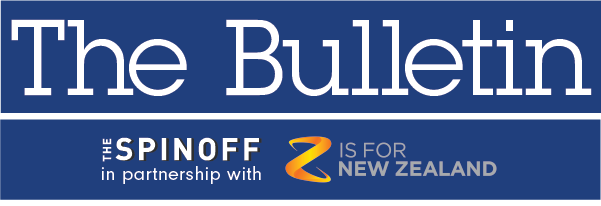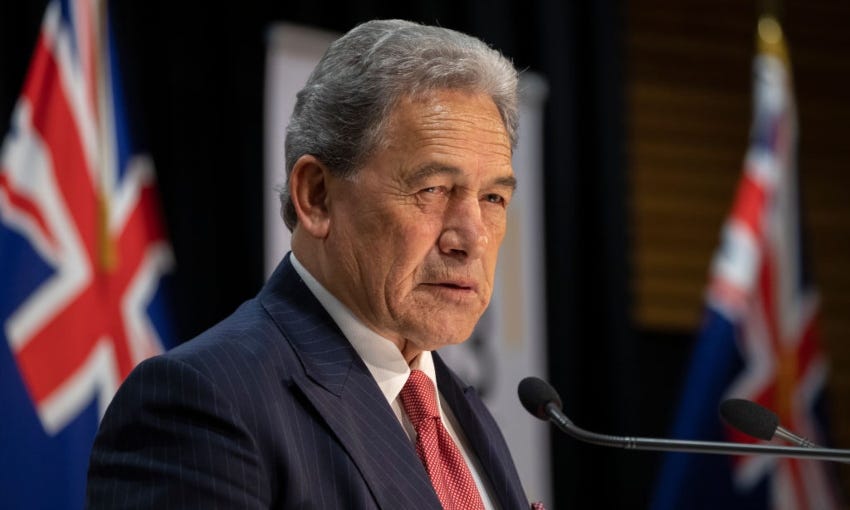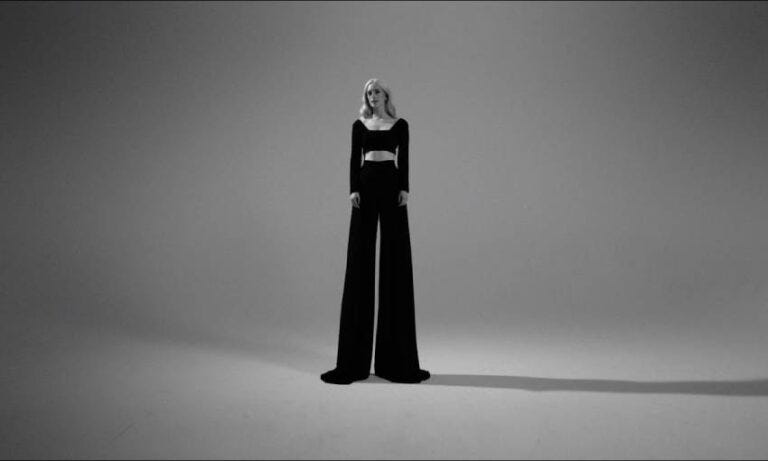Winston Peters pushes his way back into the spotlight
In a pair of speeches, Peters has recaptured the political initiative

Good morning and welcome to The Bulletin for Thursday 30 April, by Alex Braae for The Spinoff. Presented in partnership with Z Energy.
In today’s edition: Peters captures political initiative with pair of speeches, future shape of unemployment in the spotlight, and second set of anti-semitic tagging at Auckland maunga.

Image: Winston Peters delivering his foreign policy speech (Getty Images)
Over each of the last two years, PM Jacinda Ardern has been at the centre of coverage of an epoch-defining news event. And then both times after the initial story had started to wane, her deputy PM Winston Peters found his way back into the headlines.
So it was yesterday, when Peters revealed an explosive news line – that the health ministry had recommended that New Zealand's border be closed, even to New Zealand citizens. Here's a story on it from Newshub. “The Coalition Cabinet rejected that advice because it was and is inconceivable that we will ever turn our backs on our own," said Peters, making the point in response to criticism that the government's overall Covid-19 response had been overly captured by the health ministry. There was also a classic use of a technique to shift the conversation – Peters said it would have been legal to block the border, legal experts pointed out that assertion was incorrect, but all the while, the underlying story remained that Cabinet had rejected the advice, and it was Winston Peters telling us so. Dr Ashley Bloomfield, the top bureaucrat at the health ministry, was forced to clarify and defend the advice less than an hour later from the same Beehive podium.
Why on earth was Peters telling us this? The non-cynical explanation was that it was just one detail in a wider speech about the MFAT response to Covid-19, and that the advice would have been released at some stage anyway. For a perspective that recognises that we're talking about a highly skilled politician here, the strongest analysis comes from Radio NZ's Jane Patterson. She argues that the decision to go public would have been based on a few factors – to make it clear that health wasn't calling the shots, to present a particular image of the government and its concern for citizens, and to get Peters himself into the headlines. "All political parties are getting antsy about the incredible amount of exposure Prime Minister (and Labour Party leader) Jacinda Ardern continues to get day after day with the September election still high on their minds. That's not just the opposition but also Labour's partners the Greens and New Zealand First," said Patterson.
It also follows Peters' return speech to parliament, which got much deeper into his vision for the country than we'd normally get from a politician. One could almost say it sounded like he had spent several weeks thinking about the subject matter, perhaps while fishing. There was a really good column on the speech by the NZ Herald's (paywalled) Fran O'Sullivan – ignore the poorly chosen headline about Peters turning to the Trump playbook – it was both a more complex speech and a more nuanced piece than that sort of reduction warrants. While Peters talked about onshoring of jobs, import substitution, and more protectionist trade policy, there was also a discussion of how those ideas might look in the future, rather than just looking back wistfully at how they used to be in the past. As O'Sullivan noted, Peters was "by far the most interesting of the five political leaders who made statements in Parliament yesterday, even including Prime Minister Jacinda Ardern." She concluded by saying it sets up a genuine contest of ideas for the election. Politik's Richard Harman also picked up on the pair of speeches, saying "both were “branding” exercises for NZ First, designed to underline its pragmatic, nationalistic response to issues."
Right now, that election is still set down for September as planned. There's an outside chance it will take place later in the year, if the country is back in a state of severe restrictions to fight Covid-19. Before all of this, NZ First's election looked likely to be defined by one story – that of the Serious Fraud Office investigation into the NZ First Foundation. And now, it's much less clear whether voters will care about that. Obviously with such a long time still to go it's foolish to make predictions, but it is clear from the last couple of days that Winston Peters has every intention of raising other topics of conversation.
Just quickly, a message from our editor Toby Manhire:
"Here at The Spinoff, members’ support is more important than ever as the Covid-19 crisis lays waste to large chunks of our commercial work. It's a tight time for everyone, of course, but if you’re able to, please consider joining Spinoff Members to help us stay afloat and keep producing work by the likes of Siouxsie Wiles and Toby Morris, whose collaborations have had a real impact in New Zealand and around the world."
There are a lot of pieces worth reading coming out at the moment about the future shape of unemployment, and here's a selection of some of them: Stuff's Susan Edmunds has reported on the current rush of people going on the Jobseeker benefit, with the numbers now higher than during the Global Financial Crisis. And Stuff's Thomas Coughlan has analysed the current policy proposals, and is predicting those numbers to get sharply worse when the wage subsidy comes to an end.
Meanwhile, we know that tens of thousands of people have recently taken up the Jobseeker benefit, but we know very little else about them. In fact, as this analysis from the NZ Herald's Kirsty Johnston and Chris Knox shows, there won't be comprehensive real time demographic and sector data on this month's unemployment until June. The data simply isn't being recorded and subsequently reported in a way that will make it available any quicker than that. A problem with this is that it delays decision making from both policymakers and businesses who might hire, and leaves both flying blind about who might be out there looking for work.
And on a slightly different tangent, Duncan Greive has continued his big-picture series on the industries that will be hammered over the coming months, and why there might be reasons for optimism about what comes next.
A second burst of anti-semitic vandalism has appeared at the Auckland maunga of Ōwairaka, reports Leonie Hayden for The Spinoff. It's the second time since lockdown began, and accusations over who has been putting it up have been flying thick and fast. One group who has denied any involvement is the Honour the Maunga protesters, who have been in a long running battle with the decisions of the Tūpuna Maunga Authority.
Daily new case numbers have been very low for more than a week now, and yesterday there were just two more. It might therefore be tempting to be complacent if you come down with symptoms consistent with Covid-19. The latest advice from Siouxsie Wiles and Toby Morris is very clear here – you must get yourself tested if you have symptoms. Because if you delay and it does turn out to be Covid-19, it makes the job of contact tracing much more difficult.
Former National MP Jami-Lee Ross is in the early stages of forming his own party, reports Jason Walls for the NZ Herald. Currently sitting as the independent MP for Botany, Ross says his party will be called Advance New Zealand. He is currently facing charges over allegations relating to donations made to his former party. If Advance NZ does get off the ground, it will be a difficult path back to parliament. Ross will be running against former Air NZ CEO Christopher Luxon in Botany, and parties based around renegade MPs tend not to perform strongly – for example, Brendan Horan's Independent Coalition party only stood in the 2014 election, gaining only 872 votes.
For those who have been savouring their fast food fix: progress has been made by receivers on keeping the Burger King chain afloat. Business Desk (paywalled) reports that suppliers and landlords in particular will forego large payments, as the business is prepared for sale. Union reps say payments to workers will not be put at risk in the process. Most of the chain's stores are currently open at level three, except for a dozen that don't have drive-through services.
Something weird is going on within the top ranks of the NZ Nurses Organisation union. As Stuff's Andre Chumko reports, the resignation of president Grant Brookes last week has now been followed by three members of the board quitting. It comes at a critical time for the union, both because of the ongoing strain of Covid-19, and because a round of pay bargaining with DHBs is coming up.
A couple of corrections to yesterday's lead on how Covid-19 is affecting the Pacific: A reader called Parker had these points to make, which I'll quote in full. My apologies for getting this wrong.
1) The Asian Development Bank is not backed by China - the common consensus is that it's dominated by Japanese (and US) interests i.e. it has a practice of always having a Japanese president. I think there might be confusion with the Asian Infrastructure Investment Bank, which is headquartered in Beijing.
2) The SPC is not an NGO - it's an international organisation made up of states in the Pacific.
Got some feedback about The Bulletin, or anything in the news?
Drop us a line at thebulletin@thespinoff.co.nz

Right now on The Spinoff: Kiwibank’s Nigel Gaudin has a really useful set of advice for small businesses facing the next two years. Dr Siouxsie Wiles explains where the name Covid-19 comes from, for anyone who is confused. Toby Manhire has written up a survey of schools, and how many kids attended their first day of being open again. Anthropologists Susanna Trnka and Sharyn Graham Davies explore the concept of home, and how bubbles can be a problematic concept for many. And Josie Adams speaks to Chelsea Jade about her bizarre but cool new music video.
For a feature today, a video, and then some analysis of what it all means. An enterprising Youtube user has created a supercut of dozens of different Covid-19 themed ads, and picked out the common tropes – it can be watched here.
And then for the analysis, I'd recommend you read this piece on the NZ Herald (paywalled) by advertising strategist David Thomason, who asks the question of why the style of advertising for very different brands has converged so rapidly. Here's an excerpt of his insightful take on it all:
Distinctiveness is about originality and individuality. It's about outliers and boldly focused initiatives. Increasingly we have herding instead - an ancient instinct that's all about following and fitting in. What's changed is that new channels have accelerated and broadened the effect. Mediocrity is a virus, and technology is enabling it to move throughout the global marketing and advertising industry with ease.
If we're all exposed to the same stuff our output starts to look the same. At least until it all changes simultaneously with the next global trend. Recently it's been "social purpose" advertising. Has this approach worked for some brands? Of course. Particularly if, like Dove, you were one of the first to do it - way back when it was truly distinctive. But once every second brand has loudly declared their commitment to diversity, health and education through their advertising, no one gains an advantage.
Break out the national anthem for this one. A New Zealand athletic hero has completed the Tour de France from his New York living room, reports Stuff, using an exercise bike to do every kilometre of every stage. For the final stage, he took the bike down to the street, and celebrated with a bottle of champagne. To put it simply, you can't keep champions down for long.
That's it for The Bulletin. If you want to support the work we do at The Spinoff, please check out our membership programme.




